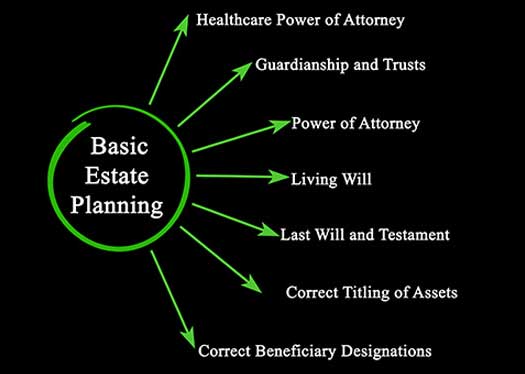Wills, Trusts and Probate
Wills, Trusts & Probate
Protection Against Lawsuits
One way to safeguard your assets is to give them or title them to a family member. However, in doing so, you put your assets at risk to their creditors, including lawsuits, bankruptcy, and divorce. Transferring assets (including your business) to an irrevocable trust is sometimes a much better strategy against judgments obtained from a lawsuit. This way, you are protected from business liabilities and your business is protected from your personal liabilities. There are pros and cons to any asset protection strategy. I can help you select the best strategies based on your circumstances. Contact us today.
Estate Planning
Contrary to what many people think, estate planning is not only for the rich. Everyone needs to do at least some basic estate planning. At the very least, every adult should have the following documents:


Last Will and Testament
A will is a legal document that states a person’s final wishes regarding property and heirs. Whether you have a large or small estate, and whether you have many beneficiaries or just a few, you need a will.

Durable Power of Attorney
This legal document allows you to designate someone to make financial decisions for you. Durable powers of attorney can be very limited or broad. Sometimes, a power of attorney allows someone to act on your behalf in only one transaction.

Documents Related to Health Care
An advance directive or living will provides crucial information to medical providers if you are not able to. If you become incapacitated without signing one of these documents, your family may have to ask a court to appoint a guardian to make decisions for you.
Estate Administration
This is the process for winding up your affairs at death. It is handled through the probate court. Probate is subject to court rules and procedures and, of course, costs time and money. Often, it can be a troublesome process depending on family dynamics and the complexity of the estate. There are testate and intestate estates, such as:
An Estate With a Valid Will
If you left a valid will, your executor will file it with the probate court to get letters testamentary (a testate estate). The executor must give notice to potential heirs, who have the right to object to the executor if they want to do so. If that is the case, the probate court will hold a hearing to decide whether to proceed. If so, the court will issue the letters testamentary.
The executor will get the legal authority to process your estate and probate assets from the letters testamentary. Once the letters testamentary are issued, the executor has several duties.
The executor must give notice to creditors, pay claims against your estate, gather and manage assets, then make distributions to heirs. It is important to note that the executor is not personally liable for the debts of the estate.
Probate is a public process and takes several months and sometimes years to complete. Depending on the level of agreement among the heirs and complexity of the estate, it could take several court hearings.
An Estate Without a Valid Will
Probate estate administration gets far more complicated and expensive if you do not leave a will (intestate estate). If you have no will, someone will petition the probate court for letters of administration, and then go about the business of settling your estate The administrator will have to post a bond which can be expensive.
The probate court is also more involved during an estate administration. The administrator of the estate prepares an inventory of the estate assets and reports back to the court, sometimes several times. This process is expensive, time-consuming, and, frankly, tedious.
Conservatorships and Guardianships
The probate court also handles guardianships and conservatorships for those who need someone to manage them and their money. This happens when one becomes incompetent and do not have a financial power of attorney or health directive with a medical power of attorney (often called a proxy).
Conservatorship
A conservator is a person appointed by the probate court to manage the property and assets of a minor or incapacitated adult. A person may be legally incapacitated for purposes of a conservatorship for various reasons, including mental or physical infirmity, chronic drug use, detention, or confinement. The duties of a conservator include but are not limited to:
Investing and reinvesting funds
Managing bank accounts and deposit accounts in financial institutions
Caring for or disposing of personal property
Managing real estate
Dealing with stocks and bonds
Paying taxes and routine expenses
Employing attorneys, accountants, and other needed professionals
Furthermore, with prior court approval, the conservator may also:
Participate in the operation of a business
Subdivide land
Demolish improvements and dispose of real estate
Is a Bond Required?
Yes, a bond is required for a conservatorship and is normally set at 110% of the amount of liquid assets that will be managed. The bond can be raised or lowered by the court as the liquid assets increase or decrease. It is normally obtained from an insurance company and involves an annual premium.
Are Inventory and Accountings Required?
Each conservator must complete an inventory of the estate and file it with the court within 90 days of being appointed. Thereafter, the conservator must give an accounting to the court at least every three (3) years or more frequently if so ordered.
Guardianship
A guardian is a person who has been appointed by the court to be responsible for the personal care of an individual then referred to as a ward. The ward may be a minor or an incapacitated adult. The duties of a guardian involve the personal care of the ward and include but are not limited to:
Assume responsibilities of a parent regarding support, care, and education (if a minor)
Exercise custody of the ward and establish a home place
Consent to medical care
Consent to marriage or adoption
Report the condition of the ward to the court as directed
Trusts
It is possible to bypass probate entirely by using trust-based rather than will-based planning and by having a financial power of attorney and an advance directive for health care.
A trust is an entity you create in which to own and manage your money and assets. There are different types and the revocable is a popular alternative to will planning since it does not require probate to distribute your assets at death.
It also has great flexibility in that you can contribute or remove assets at your discretion or shut it down entirely. Additionally, it provides privacy and allows you to distribute without filing a court preceding that is public record. Three common trusts are:
Revocable Trust
The person making the trust can add and remove property from a revocable trust.
Irrevocable Trust
The person making the trust cannot take back the property they put in the trust even though they can control and use certain types of assets in the trust. The main purpose of this trust is asset protection from lawsuits or creditors.
Special Needs Trust
This trust does exactly what the name says—provides money to use for people with special needs. It is also referred to as a supplemental needs trust.


